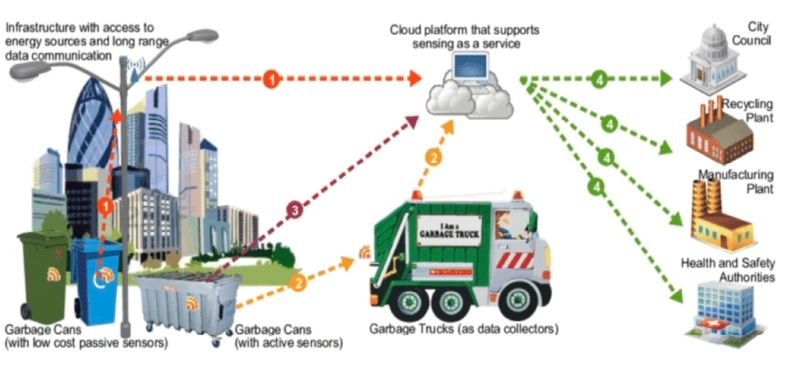IoT Platform India’s Contribution to Smart City Initiatives
The idea of “smart cities” signifies a dramatic change in the planning and development of metropolitan areas. Fundamentally, a smart city uses technology to boost operational effectiveness, promote sustainable growth, and improve the quality of life for its citizens. The Internet of Things (IoT) platforms play a crucial role in propelling smart city efforts that reshape urban living in India, a country experiencing rapid urbanization. This guest article examines the impact, advantages, and difficulties encountered in the process of changing smart city initiatives in India through the use of IoT platforms.
Comprehending IoT and Smart Cities
Information and communication technology (ICT) is incorporated into a smart city’s infrastructure to improve services, expedite processes, and raise standard of living in general. Efficient energy management, better public transportation, increased security, and improved waste management are all important components of smart cities. The Internet of Things (IoT), which connects different devices and sensors to gather and analyze data, is the underlying technology that enables these improvements.
IoT platform, which offer the infrastructure required to connect, manage, and analyze data from numerous IoT devices dispersed throughout the urban environment, serve as the foundation for smart city efforts. These platforms provide:
- The collection of real-time data.
- The extraction of actionable insights.
- Implementing solutions that meet citizens’ demands while maximizing available resources in cities.
Important IoT Platform India Advancing India’s Smart City Projects
Several IoT platform India greatly aids the advancement of smart city initiatives in India. These systems enable various smart city applications by providing all-inclusive solutions that combine analytics, data management, and connectivity. Here are a few noteworthy instances:
First, Tata Communications MOVETM Internet of Things Link
One of the top IoT platform India offering end-to-end connection and management solutions is Tata Communications MOVETM IoT Connect. It is compatible with many smart city applications, such as environmental monitoring, smart lighting, and smart transportation. Urban planners and city managers can benefit greatly from the platform’s seamless integration and control of IoT devices, made possible by its solid infrastructure and worldwide reach.
Impact on Smart Cities: Cities may improve public safety, optimize traffic flow, and save energy costs by using Tata Communications MOVETM IoT Connect, which makes real-time data collecting and analysis easier. For instance, this platform’s intelligent traffic management systems can evaluate traffic patterns and modify signal timings to lessen congestion.
2. Internet of Things by Airtel
Airtel’s IoT platform India offers Bharti Scalable connection options, which is intended for various smart city uses. Thanks to Airtel IoT’s safe and dependable connectivity, cities can deploy and effectively manage various IoT devices. The platform supports applications including smart parking, smart trash management, and smart meters.
Impact on Smart Cities: The possibilities of Airtel IoT enable cities to enhance service delivery and operational efficiency. Smart meters, for example, can track electricity and water consumption in real time, improving resource management and reducing waste. Furthermore, intelligent parking systems can direct vehicles to open spaces, reducing traffic in crowded places.
3. Dependency on Jio IoT Platform India The goal of Jio’s IoT platform India is to give smart cities complete connectivity and data management options. The platform facilitates various applications such as smart transportation, smart infrastructure, and smart surveillance by utilizing Jio’s vast 4G and soon to be 5G network infrastructure.
Impact on Smart Cities: Jio IoT allows cities to implement high-bandwidth applications like real-time traffic monitoring and high-definition video surveillance. This improves both public safety and the administration of urban infrastructure. Smart surveillance systems, for instance, can assist in identifying and handling situations faster.
4. The IoT Suite from Bosch
Bosch IoT Suite provides a flexible framework for controlling IoT applications and devices across multiple domains. The Bosch IoT Suite is compatible with smart building management, smart energy grids, and environmental monitoring applications in the context of smart cities.
Bosch IoT Suite has an impact on smart cities by helping to create sustainable and effective urban environments. Smart building management systems, for example, can modify heating, ventilation, and air conditioning (HVAC) systems based on real-time data to maximize energy efficiency and improve occupant comfort.
IoT Platforms’ Effect on Smart City Initiatives
Urban regions gain many advantages from the incorporation of IoT systems into smart city efforts, such as:
1. Increased Effectiveness and Optimisation
Cities can gather and examine enormous volumes of data from a variety of sensors and devices thanks to IoT platform India. By using this data-driven strategy, city planners can minimize inefficiencies, optimize operations, and make well-informed decisions. For instance, real-time data from smart lighting systems can change brightness, saving money and energy.
2. Better Public Services
IoT-powered smart city applications raise the standard of public services. For example, real-time information on bus and rail schedules can be obtained through smart transportation systems, which can assist locals in making more efficient travel plans. Similarly, intelligent waste management systems can minimize operating expenses and environmental effects by streamlining collection routes and timetables.
3. Enhanced Security and Safety
IoT platformIndia improve public safety by utilizing cutting-edge monitoring and surveillance technologies. Traffic accidents and illegal entry into prohibited areas are two examples of security hazards that can be identified and addressed using real-time data from smart cameras and other sensors. This proactive attitude to safety contributes to making urban areas safer for inhabitants.
4. Urban Sustainability
Smart city projects facilitate urban development that is both sustainable and powered by IoT technologies. Cities may support sustainable practices and lessen their environmental impact by maximizing resource utilization and cutting waste. For instance, smart grids can integrate renewable energy sources and reduce dependency on fossil fuels to manage electricity distribution more effectively.
IoT Platform Implementation Challenges for Smart Cities
Even though IoT platform India have a lot to offer, there are a few obstacles that India must overcome before implementing smart city initiatives:
1. Security and Privacy of Data
Data security and privacy are issues brought up by the gathering and processing massive volumes of data from Internet of Things devices. A major difficulty is ensuring private data is shielded from breaches and illegal access. Ensuring the safety of user data requires the implementation of strong security mechanisms and data encryption technologies.
2. Network and Infrastructure
IoT solutions must be deployed successfully, which means a strong infrastructure and dependable connectivity are essential. Implementing smart city projects may encounter obstacles due to inadequate infrastructure in certain regions, especially those that are rural or underserved. For wider use, increasing network coverage and enhancing connectivity are essential.
3. Cooperation and Coordination
Integrating different IoT systems and devices into a coherent smart city architecture can be difficult. For smooth operation, compatibility across many systems and technologies must be guaranteed. To overcome integration issues, standardizing standards and encouraging stakeholder participation can be helpful.
4. Price and Finance
Smart city plans require large infrastructural and technological investments to be implemented. Managing expenses and securing funds can be difficult, particularly for smaller communities with tighter budgets. Financial limitations can be addressed using creative funding structures and public-private collaborations.
Conclusion
IoT platform India are revolutionary in propelling smart city projects in India by providing creative solutions that boost productivity, enhance public services, and encourage sustainable urban development. At the forefront of this technological revolution are platforms such as Tata Communications MOVETM IoT Connect, Airtel IoT, Jio IoT, and Bosch IoT Suite, which allow cities to use data and connectivity to create smarter, more livable surroundings.
The benefits of IoT-driven smart city efforts outweigh the difficulties and open the door to a more efficient, sustainable, and connected future. IoT platform India adoption will be essential in forming India’s future cities as it continues to urbanize and change, ensuring that they accommodate inhabitants’ requirements while embracing technology advancements.
Read more:https://thesimplesource.com/the-impact-of-iot-on-supply-chain-management/





